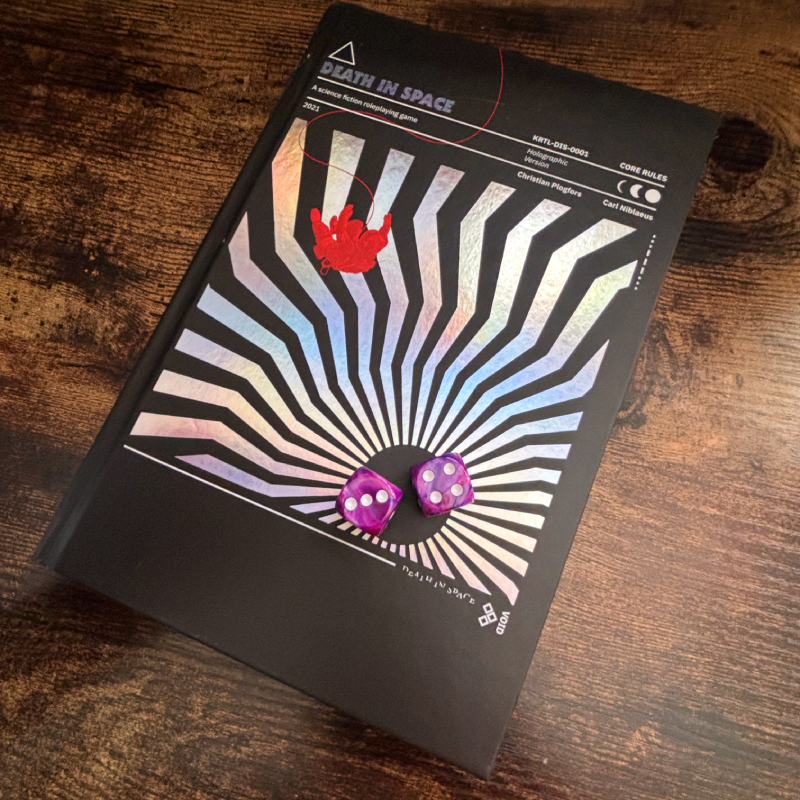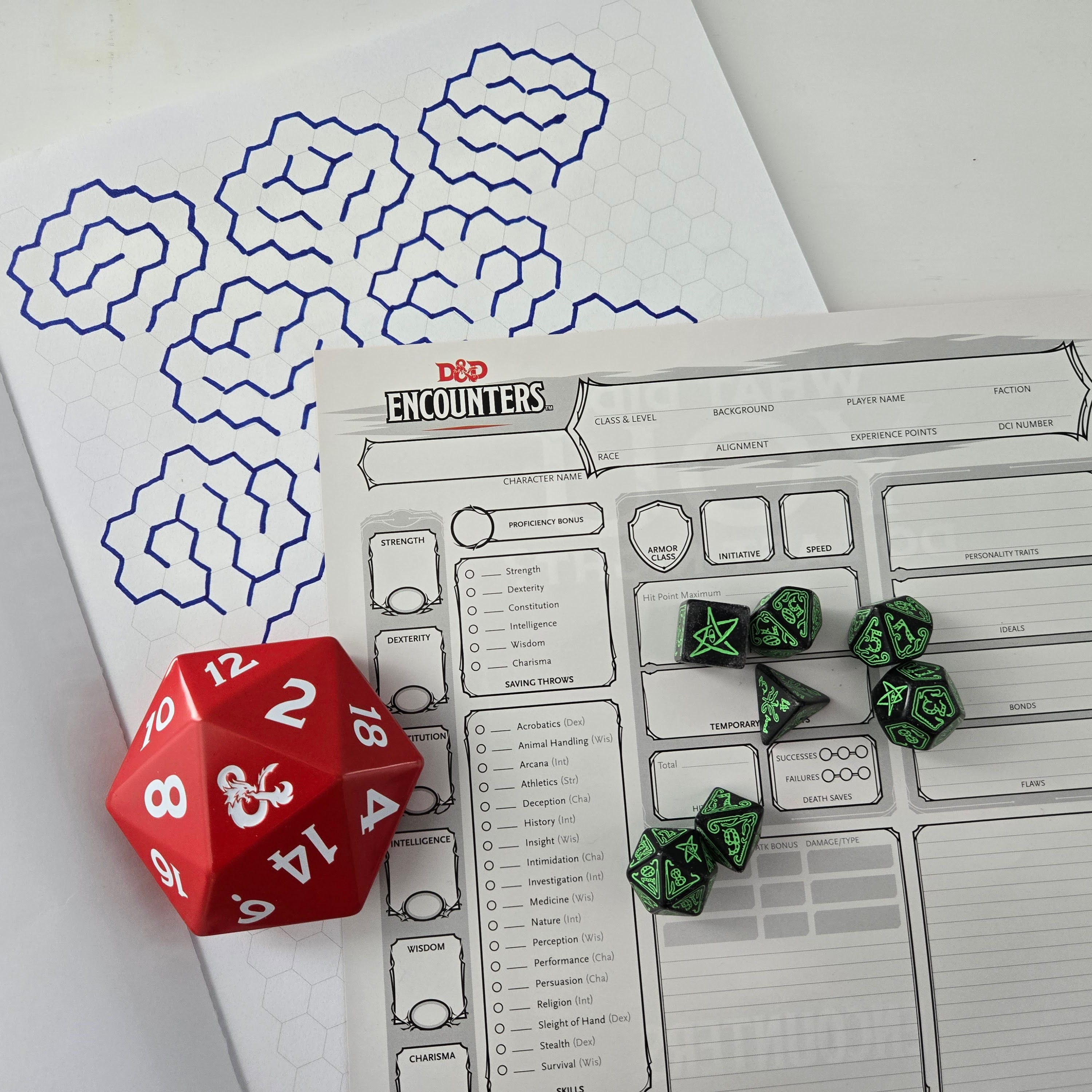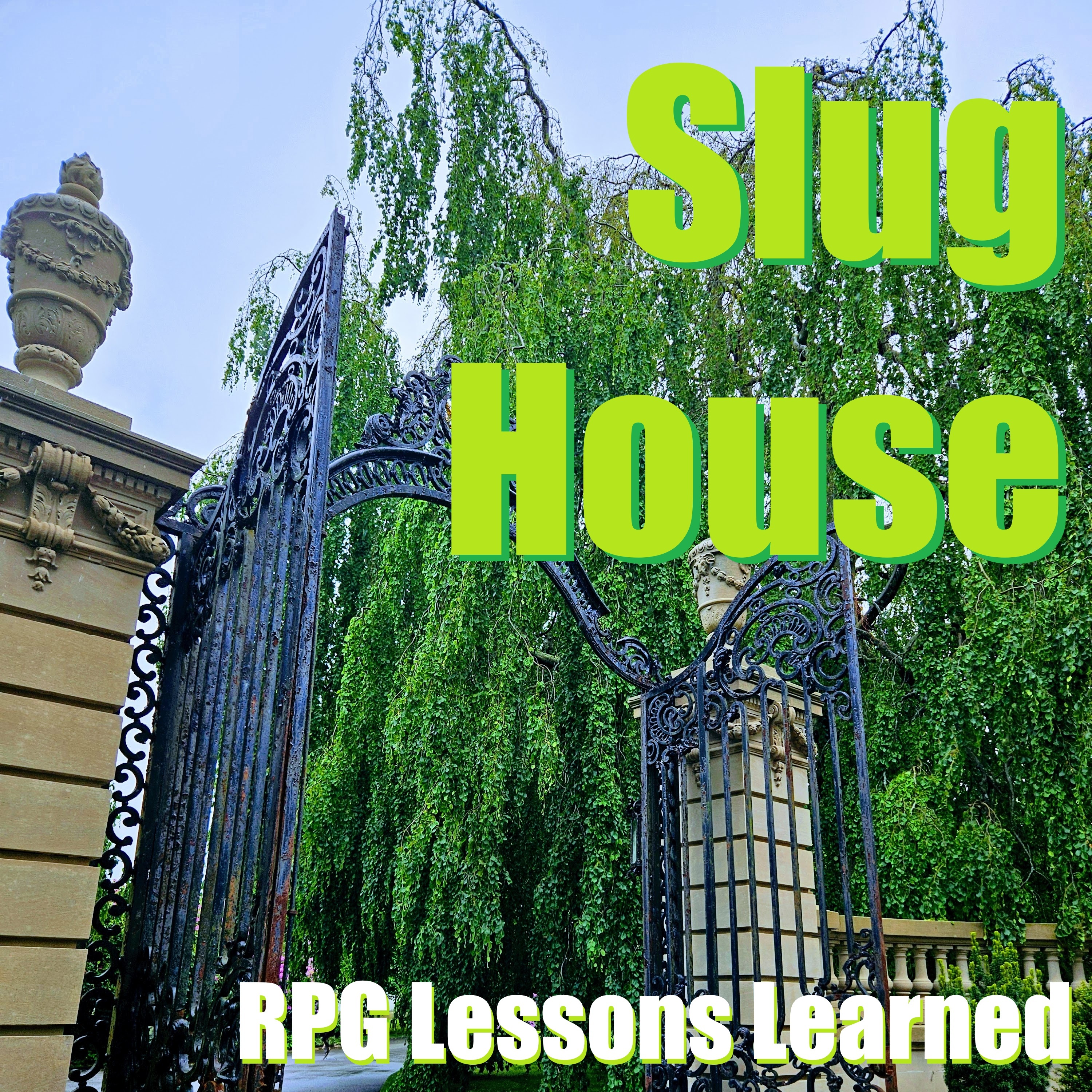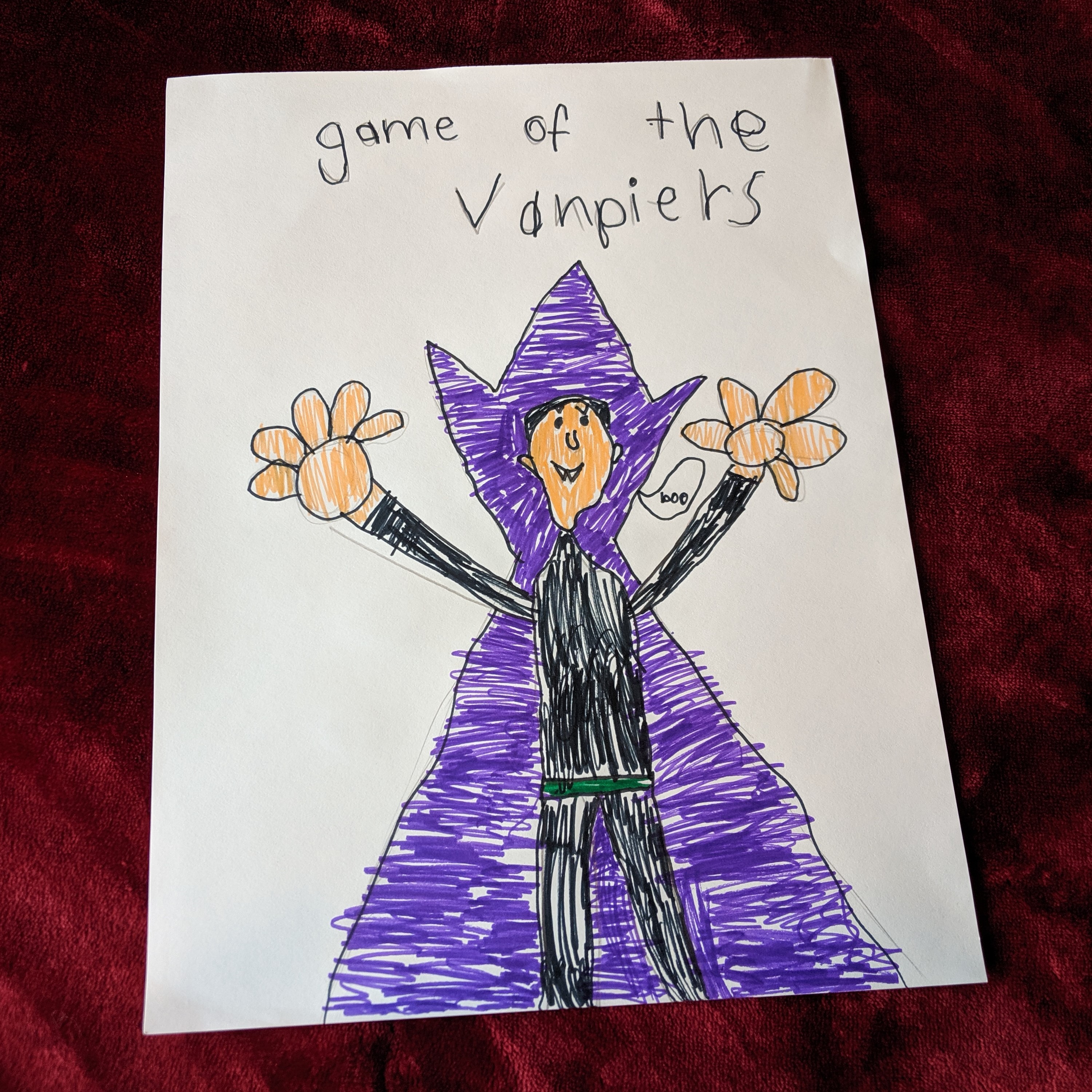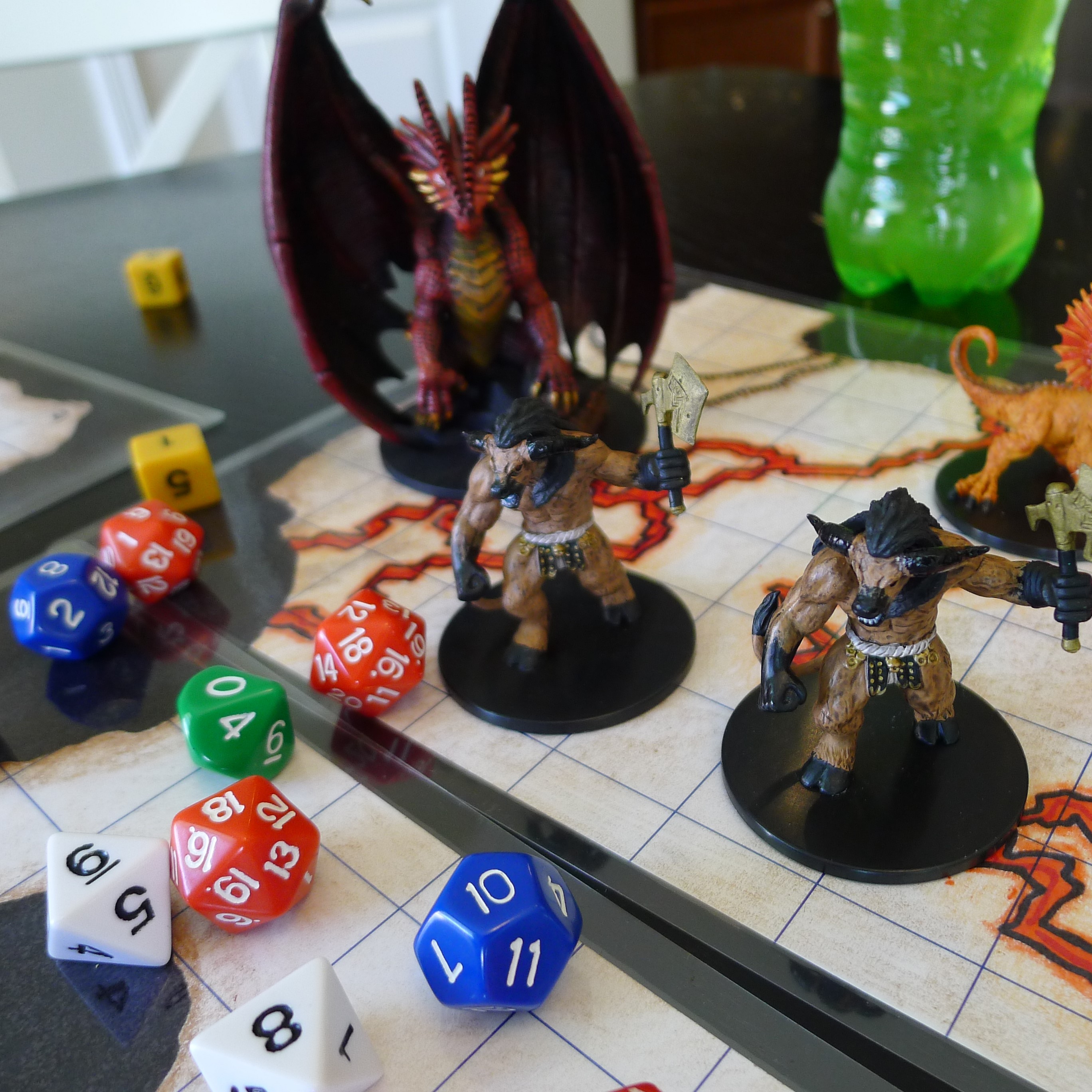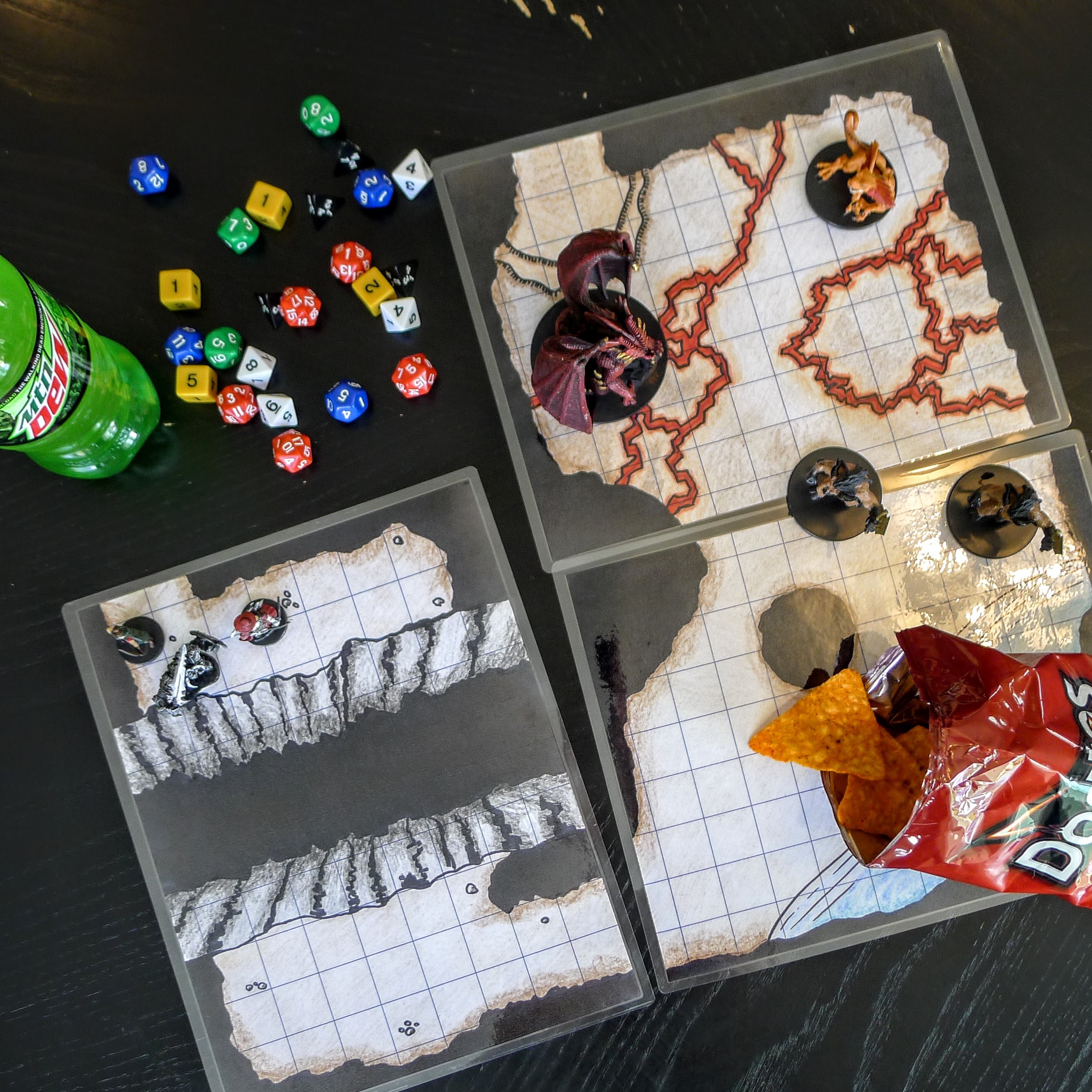[00:00:00] Speaker A: RPG Lessons Learned when the game is over, when your players are gone, that's when lessons are learned.
Find us
[email protected].
email us at rpgllpodcastmail.com and find us on BlueSkyPGL.
[00:00:25] Speaker B: Hello everybody, and welcome to another episode of the RPG Lessons Learned podcast. This is episode 904. I have no idea what episode number this is, uh, or when this is coming out, but I'm Tanner. I am your perennial host, and I'm here with your big host, Dusty. What up, Dusty?
[00:00:42] Speaker A: Tanner? How's it going?
[00:00:44] Speaker B: Oh, it's going great. Uh, we just played a game, a new game to the both of us, Death in Space.
And it was a short session and it had some ups and downs and I'd like to digest it. Uh, if you got the time.
[00:00:56] Speaker A: Why don't we start with numeric ratings? It feels like a while since we've done that.
[00:01:01] Speaker B: Yes.
[00:01:01] Speaker A: Out of 10. Out of 7 to be fun. Out of. Out of 11 to be weirdos.
[00:01:06] Speaker B: I like out of 10. That's what makes most sense to me.
What would you give this session?
And I want you to be completely honest.
[00:01:15] Speaker A: Yeah. Yeah. Probably a six.
[00:01:18] Speaker B: Really? A six?
[00:01:19] Speaker A: I think so. Yeah. It was, it was better than the medium, but I struggle with games that are this unstructured.
[00:01:27] Speaker B: Yeah, I would give this a. If I was generous, I would give this a four.
[00:01:33] Speaker A: Oh, uh, I thought you were. I thought when you said really it's about six, I thought you were gonna go higher than me.
[00:01:36] Speaker B: No, no, I, I didn't feel great about this one. And I don't think that's on you at all. I think it's. Well, we can get into it.
[00:01:43] Speaker A: So I generally do rate higher than you, but I do.
I thought I was gonna be bad cop with the six, and now I feel like I'm good copying with the six. I do, I do stand by my six. I do think it was not a negative experience.
It's like when you see a movie and you're like, okay, it's how I feel about the first Joker movie. Mhm.
I enjoyed it, but I will never watch it a second time.
[00:02:09] Speaker B: Gotcha. Is that how you feel about this game? I guess. Cut into the chase. Would you play this game a second time?
[00:02:14] Speaker A: Yeah, I was toying with the idea of purchasing it. Okay, now I'm not interesting.
[00:02:20] Speaker B: So it is a, um, the game is called Death in Space and it's an OSR inspired dirty sci fi game inspired a lot by Morkborg, which neither of us have played. I think. Right. I haven't played it.
[00:02:34] Speaker A: I own two copies of it, but no, have not played it.
[00:02:37] Speaker B: And like Morkborg, it has a very gorgeous book. Like really great quality book. I backed this on Kickstarter back in the day. Um, and unlike Morkborg, it is laid out in a way that is like ready to play. Like it's pretty and functional at the same time. You've seen my PDF of it that I sent you? Yeah. Would you agree that it's a stylish looking game?
[00:02:59] Speaker A: Oh, like Mork Borg, it is absolutely gorgeous and I agree with you. Uh, again, part of the reason I stand by my six is I had a lot of fun rolling up my character.
[00:03:11] Speaker B: Yeah. Do you want to talk? Let's start with that then.
[00:03:14] Speaker A: Uh, yeah, character creation was a bunch of random tables and I'm here for it. I wound up playing someone that I don't think I would have ordinarily chosen for myself.
[00:03:24] Speaker B: Yeah, you were a hibernating spacer who was an event horizon diver. So you went into black holes looking for goodies and mysteries and you were a bit of a sciencey invent type, at least in personality, if not in skill set.
I think, uh, that I do like all the random tables and I think to your point of like, would you buy this game or not? I think the system is like so straightforward as to almost be not worth paying for, honestly. However, we only engage with part of it. We didn't engage with any of the ship combat or building rules or anything like that.
And we are playing this one on one and we didn't have combat. So like, maybe we're not exploring the system to its fullest extent, but this game is full of awesome range, random tables. I think for a gm, um, it's worth buying a PDF of this game if you run sci fi games. I would say that unequivocally.
However, I agree that like the system is just like, like it's a D20 system and you're rolling and you're adding a number and you're trying to hit a target number. You know what I mean? Like, I don't want to sound rude, but like how many more of those do we have to buy?
[00:04:34] Speaker A: There's a lot of them. You make a great point in that.
Back to a previous point you made in the middle of that. Make a great point that playing the solo just for the listener at home. I was playing essentially a one hit point wizard.
[00:04:47] Speaker B: Yes.
[00:04:48] Speaker A: I mean it's in space, it's in the future. So not Really a wizard. But, uh, the only spell I had was cut the space station open from outside and kill everyone.
So power word. Vent the atmosphere.
[00:05:02] Speaker B: Yep.
[00:05:04] Speaker A: And uh, I had one hit point. So I was avoiding combat like the plague the whole time. And when you say one on one, you really need a more well rounded character. You need someone who can kind of do it all and like survive one or more hits.
Giving this game a six and you giving it a four is kind of like playing a dungeon in D and D with a one hand point wizard and no one else and being like, yeah, I didn't really enjoy that. Like, no, you wouldn't.
[00:05:29] Speaker B: Yeah, I. I think we should. We should be more fair to the game. I think if we played this game the way it was designed, um, with a party. With a party and with a bunch of people bouncing ideas off each other and different types of characters who could take different types of risks, maybe we would have had a better time with it. I do think that the setting and the tables and stuff are very cool. And I do like the adventure that we ran even though we didn't have like a roller coaster of a time with it. The adventure which is the one that's in the book is called welcome to the Ring.
And basically you land on the space station and it has all of my favorite things about a one shot, which is it has a timer. First off that the end state of the adventure is on its way. So basically there are two warring gangs who are each controlling different parts of life, support of the station, and a bunch of people caught in the middle. You're there with a debt and you have to get your ship fixed and get fueled and get out of there before the authorities come to crack down on both of these gangs. Um, and I like all that setup. I do. It reminds me of my holy matrimony L5R adventure, honestly, where there are two boring sides, there is a timer in which a fail state or the end of the adventure will happen.
And you have goals outside of that that you need to get done. So like as a scenario, big thumbs up for me.
[00:06:53] Speaker A: Largely agree. I think what the scenario asks of you, which is getting 500 gold pieces, essentially Hollows, getting a ship repaired and getting a ship fueled up inside of four hours is an incredibly tall order.
[00:07:13] Speaker B: Yes. So there is a how to use this adventure. And it's interesting because like you said, this is an open ended adventure. It basically describes what's going on, who is who and who has what and who wants what. And then ask the GM to Improvise. So it says this adventure starts off the crew in Aurum 80 with several problems. How the players choose to solve those problems is up to them. There is no fixed solution. This adventure presents the dominant factions and the main locations. The crew can side with one of the factions, play them against each other or something else, and there's a countdown. So like, I like that the adventure straight up tells you it's like there to use this adventure, you should read it and see what people want and need. And like, each one of the characters have a great profile which is like. Like for example Hina, who is the bartender, for example. Each character has a priority. What they want done, a resource, what they want on have a goal, a need and a reward. So like for example, um, Roy, his priority is friends and family. He wants sympathy from the other gang member.
Like, like they have all these sorts of tools to like drive making deals, which I really like. Um, but yeah, the legwork is on.
[00:08:26] Speaker A: The do that the unstructured piece. And my initial gut reaction is I don't enjoy adventures that are quite this unstructured. Yeah, this is, this is why people are gonna listen and be like, God, Dusty's the one trick pony. But, oh, well, um, this is why I like Dungeon Crawl so much. Sure things to explore in a dungeon and do things in that dungeon, which arguably this kind of was. But it was a dungeon with like five locations.
[00:08:52] Speaker B: Yeah, it was more of a set of points that were connected. Yeah.
Um, yeah. So I guess the adventure was doing the right things in my opinion. Dusty maybe doesn't completely agree, but it's nice when we don't entirely agree. We almost agree too much. Dusty.
[00:09:08] Speaker A: That's fair. And, and we don't agree like this. This to me is not a good adventure. It's too.
It's too open. You have to leave room for the player. Yeah, but there's a difference from leaving room for the player and having the player co write the adventure itself.
[00:09:23] Speaker B: That's interesting though because like when I think of like OSR type games like Open Hex Crawl type stuff like, like when we did um, when we did Hideous ah, Daylight, your goal was to stop the curse. Go. Like, did you feel. Why did you not feel like you were co writing the adventure exploring a Hex Crawl and you did for this.
[00:09:44] Speaker A: Because it felt like there was so much less content for this.
[00:09:47] Speaker B: Interesting.
[00:09:48] Speaker A: I didn't feel like I was co writing because there was so much more to engage with and so many more. Like, okay, I've. I've dealt with two of the major factions and the third player. And I still have one goal totally unresolved. Like, there's no one else for me to lean on. Sure. There's not another piece of content in this adventure for me to go achieve another one of the goals.
I feel like you, if you consider the content to be resources, I had exhausted all of the resources and still had one goal, only half achieved.
[00:10:18] Speaker B: I think it's interesting because obviously playing these games exists between the space of what is on the paper and the adventure and what happens at the table. Right. And like, I would never give if me and you have like the world's most interesting intrigue in character debate happen, that was life changing. I don't know if I credit the adventure with that because that's something that happened at our table. You know what I mean?
[00:10:43] Speaker A: Absolutely.
[00:10:44] Speaker B: So, uh, it is interesting how, like, how do you judge a role, uh, playing game? Because, like, we, we saw one very small slice of it and we maybe didn't play it right. And.
Yeah, I don't know. But like, is it on us as players to be fair judges of stuff, or is it fine with us to just have the experience we had?
[00:11:01] Speaker A: You know, I think it's. I think it's for us, I think it's fine for us to have the experience that we have cinema. Um, people enjoy movies that I don't enjoy, and people don't enjoy movies that I enjoy. None of us are wrong.
And sometimes you walk into a movie theater not in the headspace to enjoy it.
[00:11:21] Speaker B: Yeah.
[00:11:22] Speaker A: For various and sundry reasons. Um, that's not the filmmaker's fault. It's also kind of not your fault. People just.
[00:11:28] Speaker B: It's the situation. Yeah.
[00:11:29] Speaker A: People bounce off of stuff. And I think I'm bouncing off of Dead in Space, if I were.
Well, first of all, let me ask you a question before I give this opinion of the adventure.
Was there another resource that I didn't engage with that was there in the adventure that I missed?
[00:11:46] Speaker B: Not really. So basically either one of the guys who are the gang members would, uh, basically want you to surreptitiously install like a hacking module in the other guy's headquarters, which could have led to a fight or something like that. Again, like, I think that just because of the character you were, there were automatically so many options that were off the table.
Maybe, maybe if you rolled a really brawny character with a cool gun, you would have felt differently. But I don't know, that wouldn't have changed, Dusty, you know what I mean? So yeah.
[00:12:16] Speaker A: So, uh, in that case, here's the advice I would give if you were running this adventure. What's the name of this adventure? Tanner.
[00:12:22] Speaker B: Welcome to the ring.
[00:12:23] Speaker A: Welcome to the ring. If you're running. Welcome to the ring. Here's what I would say. The timer is so restrictive, which I don't always mind sometimes. Sometimes it's great. It feels good to have time nipping at your heels.
But the timer is so restrictive that if you have three essential resources. You've got this lady named Hina who runs a bar, and you get these two gangs. So you get these three resources, but you also have three goals. If you engage them, engage with them in a way where you fail some of the roles where you're having to, like, salvage situations and give m up on your goals. Halfway, I would add a fourth or even fifth resource. If you want to keep the timer that strict, give me three things to accomplish and five ways to accomplish them.
That way, if I bounce off of something, I can, uh. Okay, I've got a backup. I can go talk to these people for the 250 credits that I need.
[00:13:12] Speaker B: Yeah, I will. I will say, I don't think anybody has fuel except for Hina.
So, like, that kind of stuff is. Is interesting.
Yeah, I think it's. Yeah. Maybe the adventure isn't quite there. I think it's. It's like. It feels like 75% of the way there, but could maybe, if they wanted to write it to our proclivities, I think it could have used another pass.
[00:13:34] Speaker A: We can agree that my Star Wars D6 adventure was not great, right? There were a fairly limited number of ways through it.
[00:13:39] Speaker B: Yeah, I think your. Your adventure was way better than this, though.
[00:13:42] Speaker A: So that's my point. I total amateur with a not good adventure that I ran, and I felt like it had way more content than this.
[00:13:49] Speaker B: Yeah, I would agree.
Okay, so we're kind of down on death in space, um, which is fine because, like, I mean, it was sitting on my shelf unplayed until now. So, like, now I know. I think I would. If I had a group of players who wanted to play this, I would run it again, I think.
But I would want to engage with all the rules of the game, which we definitely didn't like.
Like, in campaign play. Like, a large part of it is, like, it's a resource, uh, like a war of attrition of, like, your modules and your gear and your spaceship are always breaking down, and you're always trying to repair them to do new jobs. And, like, I Think that could be kind of like how like every episode of Firefly, like ended with them, like in a debt or needing a. Like, I think that that could be a cool framework for a campaign.
Um, but I've definitely cooled on this quite a bit.
[00:14:41] Speaker A: I have a thought on why we keep bouncing off of some of these systems.
[00:14:45] Speaker B: Yeah.
[00:14:46] Speaker A: Liking a niche system like this is like having. I'm um, gonna go back to the cinema analogy. It's like having a really niche cinema interest.
The difference is if I like really obscure Belgian films about Cold War spies, specifically in 1955.
Mhm. You know, let's say that's a, that's a huge interest that I have for some reason.
Um, I could enjoy that either alone or with one other person. But if I am getting six friends together, right, to go to the movies, the odds that I'm going to talk my six friends into my very niche movie are low. Which is why I like people scratch their heads. Like, why does everything default to D and D?
Well, if you're getting six people to go to the movie, more people are more likely to enjoy a Marvel movie than they are that Belgian spy film from 1955.
[00:15:47] Speaker B: Yeah, you got to play the hits at a certain point.
[00:15:49] Speaker A: You know, games like this that are so niche should absolutely somehow be built for one GM and one player. If you're a super niche game, please consider those of us with jobs, spouses and kids and consider the fact that we're likely to have maybe one other friend who would want to run this with us.
And please somehow include some hacks or rules or thoughts that make solo play more feasible.
[00:16:15] Speaker B: Can we move on from Death in Space? I have some thoughts about one on one games in general that I've elucidated.
[00:16:21] Speaker A: Yeah.
[00:16:22] Speaker B: Is there any, Is there anything you want to wrap up?
I guess we're not. I think we've talked ourselves out of playing this again. I think.
[00:16:28] Speaker A: Yeah. I would only play this again if I could get a group to play it. And I doubt I could get a group to play it. I think if I got a group together, they'd want to play something more mainstream. Yeah. Having said that, again, gorgeous book. Love the character creation. And if you are 25 and childless and have tons of free time with lots of friends who want to explore niche games with a full party experience correctly, I see a lot of potential here. But having said that, I'm done talking about Death in Space.
[00:16:57] Speaker B: Yep. We can only review our experience with it at the end of the day.
[00:16:59] Speaker A: Yep.
[00:17:01] Speaker B: So, uh, I was Looking for one on one games to play and you charged me to say, tanner, it's your turn to run Almost every one on one game that I can. That I could find something designed for one on one play is a touchy feely story game. And I don't think those games are bad. I think they're not for me. I think they're like, they might be for me. I know they're not for you though.
[00:17:26] Speaker A: Oh, it's interesting.
I want to dissect that.
I think you're probably right. I just wonder, do I portray myself as like not in touch with my feelings?
[00:17:35] Speaker B: No, no, no. I just think. I just don't think that that's what you look for in games. I think that there are a lot of one on one games that are like, you are two star crossed lovers who hate each other. Now do these story building, they're creative writing type games that. And I'm trying really hard not to sound pejorative, but they are a certain flavor of games that are more story based, more character based. And I think that that's just like not our preference.
[00:18:03] Speaker A: I think some of them feel like. I think more than half of them feel like couples games.
[00:18:08] Speaker B: Yes. Uh, and I like you a lot, Dusty, but not like that. I would maybe want to, and I'm not saying this for next time, I would like to someday try one of those before we swear them off forever. Because I feel like we've already kind of avoided them from now. Um, but there are some cool ones. Like one of them was about like one of you is a gunslinger and one of you is their gun. And like you like go on weird strange adventures and like explore the relationship between a weapon, uh, and their wielder. And like, so like some of them, they're about exploring relationships a lot of the time. I wouldn't even say couples games, but a lot of them are about exploring a relationship as the core questions of the gameplay. And I don't know that that's really what interests us.
[00:18:53] Speaker A: I'm going to invoke this name carefully, understanding that, my God, you can't name a creator without them having some kind of controversy. Orson Scott Card wrote a wonderful book on writing called Characters in Viewpoint. Controversy noted in that book he describes. Uh, I think it's. Yeah, it's three different types of stories. Character driven stories.
The characters learning and growing is really the big deal. Plot driven stories like westerns, where a bunch of stuff needs to happen, characters don't really change. Or maybe one character has a small realization but really it's just, it's a series of like cool events, like a Marvel film and then setting driven stories. And like Dune is a wonderful example of that. Where, I mean, yes, there is a story. There is. I mean all three elements of plot, setting and characters are always present in a story. But Dune emphasizes setting because as much as there is character, as much as there are characters and is a plot, you're mostly learning about the setting after the butler and jihad, et cetera, et cetera, et cetera. I think I really like plot driven, event driven games.
[00:20:00] Speaker B: I would agree with that if we were to use the same taxonomy as writing, which I don't think is a direct one to one, but for this, for the purposes of this conversation, absolutely. And I think that I've had good games where we've explored character relationships, but they've been on top, they've been a delicious dessert on top of the meat and potatoes of a plot or an environment.
[00:20:22] Speaker A: Yes. And Martin's game is usually setting driven. Mhm. Again, the whole sociology background. Like you arrive at some island or some city or some place and it's like, what's, what's, what's the deal with these people?
[00:20:36] Speaker B: Yeah.
[00:20:37] Speaker A: Quote Jerry Seinfeld. Um, you're trying to figure out what's, what's the situation, what's going on.
But there's a, there's no character progression or character growth development. There's also character development.
There's a lot of events, but you're trying to get to know a setting and that's like a different and fun thing to do. But once it gets to be a character study in a role playing game, I'm not interested.
[00:21:02] Speaker B: So I guess circling back, a lot of the one on one player games are character or relationship studies.
And uh, there are people online who say you can play any game one on one, which is true. But like, can you have a good time with any game one on one? I think the answer is probably no.
So that being said, I'm kind of out of gas in terms of like what I, what new thing I would want to introduce to us.
[00:21:27] Speaker A: Are you breaking up with me or is this your way of saying no more one on one gaming?
[00:21:31] Speaker B: No, I want, I'm wondering why aren't we love dungeon crawls? Why aren't we just playing more of those?
[00:21:37] Speaker A: Because we specifically wanted to branch out and figure out adventures and then we wanted to try superhero stories. Yeah, we wanted to try other stuff, but yeah, I think this is why Scarlet Heroes was like a lightning bolt for us is it was one on one and it was event driven. Plot driven.
[00:21:54] Speaker B: Yeah. And it was a way to play this huge library of great stuff that already existed in one on one setting. I would still like to. There are still genres I would like to try. I love westerns. I would love to try like a western one on one.
I think that sounds like the types of western stories of lone drifters and stuff. I think. I don't know, would that. Would that work or.
[00:22:17] Speaker A: Um, yes. I love post apocalyptic stories. I love the idea of Gamma World.
Um, and there's a wonderful Gamma World BX marriage called Mutant Future that I've been wanting to try.
[00:22:32] Speaker B: Could we run that with Scarlet Heroes?
[00:22:34] Speaker A: Absolutely. Because it's BX based. It's old school.
[00:22:37] Speaker B: So maybe we need to just play the systems that we like some more and play around with new settings and new scenarios. I think that it's fine to explore new games because I think like watching a new movie or a new genre, like it's personal development to figure out what your tastes are and be. And to try something and say, I like this, or try something new and say, I don't like this. I don't think we've wasted our time and I'm not bitter about that. I'm just wondering, like, what are we really looking for at this point? You know what I mean?
[00:23:07] Speaker A: I'm aligned. I have an alternate suggestion, though, which is kind of where I was I was headed to.
[00:23:12] Speaker B: Sure.
[00:23:13] Speaker A: In Martin's game, I think I've often told you that I play two characters. Ooh, and Bernard, Martin's brother. I should probably. Shouldn't. Well, whatever. I won't. Probably won't remember to bleep it. But good luck figuring out who they are based on two first names. He plays two characters.
So we wound up having a full party of four characters, even though there's only three of us sitting at the table. I am very accustomed in lightweight rules like games to keeping two characters straight.
[00:23:38] Speaker B: And I've never done that.
[00:23:40] Speaker A: Would we have a better time in Death and Space if I'm playing two characters instead of one character? Is that easier to balance? Does it open up more options?
[00:23:52] Speaker B: Yeah, I think that's interesting.
You really stumped me here. I. Because that's just never a way I've played. I would have to play and find out, to be. To be honest with you, because that is a mode of playing that is completely new to me.
Um, I've never run a game for somebody playing multiple characters and I've never played Multiple characters at once.
[00:24:12] Speaker A: So it works beautifully. You have to think of it like the Wonder Twins. Like, there will never be any inner party conflict between these two characters. They will be very in accord with each other.
[00:24:23] Speaker B: Unless I want to watch you argue with yourself for 25 minutes.
[00:24:26] Speaker A: Yes. Um, but like my two characters in Martin's game, Gurney was a. Was a dwarf fighter, and Jean was a human cleric. And it was like, I'm playing Sherlock and Watson. And it's easy for me to keep straight because I've got Sherlock over here doing this, and I've got Watson over here doing this, and it just worked phenomenally well.
[00:24:45] Speaker B: Maybe we should try that next. Then that. That could be a good way to breathe some life into. Into what we're doing and give us some.
A new way to play.
[00:24:54] Speaker A: I also like your idea, though. I love Scarlet Heroes and I miss having played it. I wouldn't mind to try some new genres of Scarlet Heroes or even revisit, uh, what's his name from Indiana Jones that I played? Oh, uh, Bellman. That's right, Bellman. Revisit Bellman and see what he's made of the Stygian library.
[00:25:14] Speaker B: Sure. Yeah. So I guess, um, we have some options going forward. Death in space, a bit of a swing and a. Not a swing and a miss, but a foul ball maybe.
[00:25:23] Speaker A: Um, and probably, probably, if not certainly our fault.
[00:25:28] Speaker B: So moving forward, let's try and, uh, breathe some new life in our games.
If not mechanically, rules wise, maybe the way that we play them, we can. We can try mixing that up a little bit.
[00:25:38] Speaker A: Sounds good.
[00:25:39] Speaker B: Any, uh, any lessons learned? Lesson learned. Number one. Um, try a new game. Uh, you might swing and you miss.
Maybe we would have. We've done this one before. But like, Like, I think that you don't get conversations like this unless this was a new game that we tried that didn't totally work for us.
[00:25:55] Speaker A: And a 6 out of 10 is not a total failure. Like, I didn't love Vietnamese food the first time I tried it, but then this is a true story, by the way. But then the flavors sat with me, and I was like. And people wanted to keep going out for Vietnamese. And I was like, you know, yeah, sure. And then I figured out what to order, and I figured out the flavor profile, and I got used to it, and now I really love a good Banh Mi.
[00:26:22] Speaker B: Oh, I love banh Mi. Um, yeah. So maybe we need to sit with it and digest it a little bit more. Um, but then, yeah, Lesson two, There's different ways to play games. You can play different systems, but you can play the same systems that you love differently. So next time, maybe let's try a system that we both like and try and play it a little bit differently. How about that?
[00:26:42] Speaker A: Sounds good. Alrighty.
[00:26:44] Speaker B: Well, thanks, everybody, for listening, and, um, we'll see you next time.
[00:26:47] Speaker A: People call them reviews, postmortems, retrospectives.
We call them lessons learned, and we're sharing ours with you.
